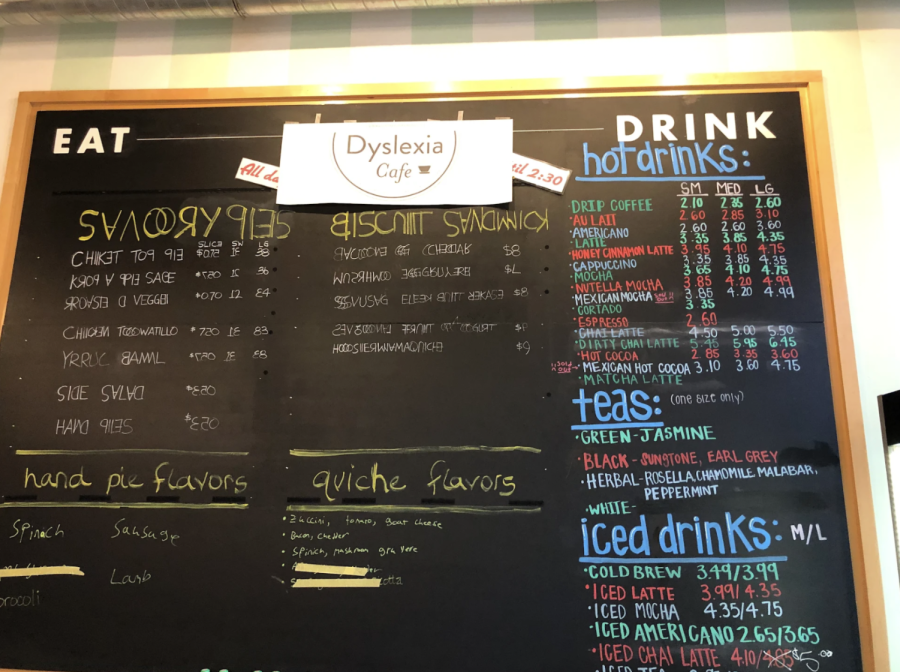Zafiro Papastratakos pushes for different reading education with Dyslexia Connection of Evanston
Photo courtesy of Zafiro Papastratakos
The menu at Hoosier Mama Pie Company’s Dyslexia Cafe organized by Zafiro Papastratakos last October. She hoped the event would show people how it felt to be a student with dyslexia.
March 2, 2022
Three weeks after Niko Papastratakos returned to school for hybrid learning, he came home and insisted school wasn’t working for him.
“‘It’s like you walk into a fog. And instead of clearing the fog, they make more fog,’” Zafiro Papastratakos, his mom, said he told her. “‘Then they start throwing things at you. And just when you get used to the shape, they change it.’”
Papastratakos introduced Niko, who has dyslexia, to an older man who also has dyslexia and affirmed his experiences. Niko also asked his mom if he could talk to dyslexic people his age.
In response, Papastratakos began the Dyslexia Connection of Evanston. She started by creating community through arranging meet-ups with other families last year, and is transitioning into advocacy to improve Evanston literacy.
In Illinois, 61% of students did not meet Illinois Assessment of Readiness expectations in 2019, according to the Illinois Report Card. In the 2020-2021 school year, 58.4% of Evanston/Skokie School District 65 students in grades 3-8 met grade level thresholds.
District 65 and Evanston Township High School District 202 formed a joint 12-year literacy plan in 2014, aiming for all high school seniors to be proficient readers within one 12-year cycle. The districts have consistently seen disparities in reading levels between white students and Black and Latine students.
Papastratakos said she initially didn’t know why her son was falling behind and credits Emily Hanford’s “At a Loss for Words” podcast with helping her understand.
Now, she said she wants to change the reading instruction offered in Evanston schools. She hopes to see a curriculum grounded in research about how students best learn to read, with an emphasis on phonics instruction.
Joyce Anderson, an Evanston parent who has one child with dyslexia, said she’s attended two of Dyslexia Connection of Evanston’s events.
“I was excited to see that there was more visibility to the challenges that our kids are facing in public school,” Anderson said. “And that there was a place for parents to come together and support each other.”
Last October, Papastratakos hosted “Dyslexia Cafe” with Hoosier Mama Pie Company on Chicago Avenue. Inspired by a similar event held in 2017, she created menus and signs with distorted text.
“The idea behind it was that you would feel the discomfort of a kid in second grade when you try to do something as simple as order a cup of coffee,” Papastratakos said.
Dyslexia Connection of Evanston also holds a speaker series. They invited Brett Tingley, an advocate for dyslexic students, in February to talk about how kids learn to read and other groups’ advocacy efforts.
Tingley started a parent group in Columbus, Ohio, to fight for changes to the school district’s reading curriculum. The group was successful in changing instruction after filing a systemic group complaint. She now advises Papastratakos on building her own advocacy group, especially because Papastratakos said she’s struggling to find time to direct advocacy efforts largely on her own.
“(Papastratakos) is now to that place where she’s like, ‘Listen, they’ve got to do something. They’ve got to help our kids learn to read,’” Tingley said.
Acknowledging that her group is largely white, Papastratakos said she’s hoping to reach out to education advocates in the Black and Latine communities and hold Dyslexia Cafes in locations with larger populations of color.
Niko used to attend a District 65 elementary school, but he is now at a private school with specialized reading instruction. He emphasized that dyslexia is a learning difference, but that doesn’t mean there’s something wrong with him.
He said he’s hopeful his mom’s work will change the reading system.
“I really like (her advocacy) because I know how I suffered,” Niko said. “I’m hoping that by my mom doing this organization, less kids will have to go through what I went through and I don’t want anybody to go through that because it’s so, so frustrating.”
Email: [email protected]
Twitter: @avivabechky
Related Stories:
— District 65, District 202 discuss expanding 2014 literacy goal at joint meeting
— D202 board talks literacy progress, AP class participation
— D65 and D202 joint committee calls for stronger literacy goals


